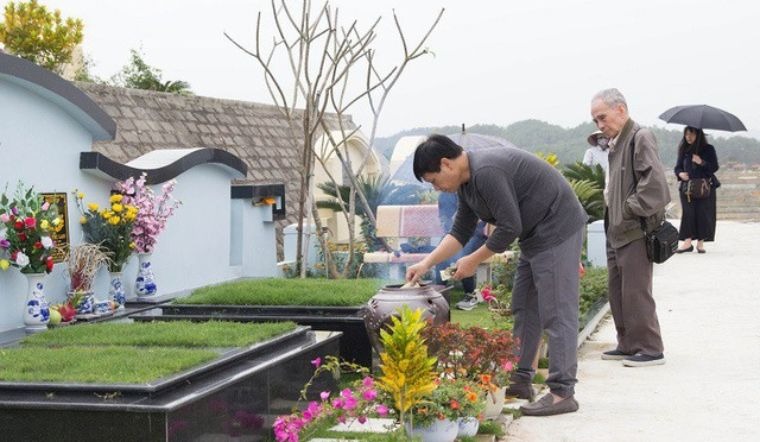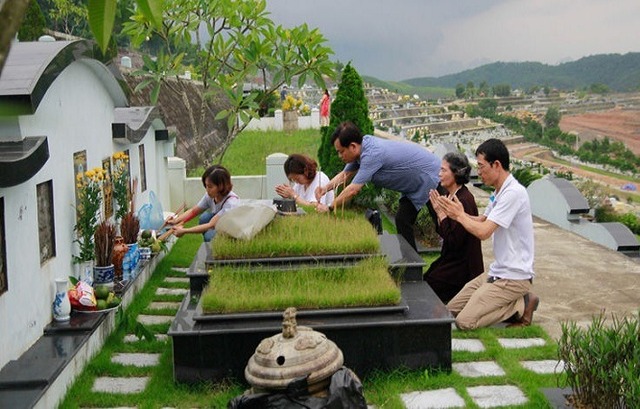The Vietnamese have long held the belief that one should “live in a house and die in a tomb.” During festive occasions and holidays, families often clean and organize their homes, and also visit cemeteries to tend to their ancestors’ graves.
However, according to ancient wisdom, there are three types of people who should refrain from tomb-sweeping to avoid bringing bad luck to the entire family. So, who are they?
3 Types of People Who Should Not Engage in Tomb-Sweeping
The Elderly with Frail Health
Ancestral worship is an important ritual, but it can’t escape the sense of solemnity and sadness. For the elderly, participating in tomb-sweeping may negatively impact their health due to old age, frailty, and the often rugged cemetery terrain.

Ancestral worship is a solemn ritual that can evoke feelings of sadness.
Should any unfortunate incident occur, it would not only diminish the significance of the ritual but also bring potential harm to future generations. Thus, the elderly, especially those over 70, are advised to stay home while younger family members take on this duty.
Children Under 3 Years Old
Tomb-sweeping is a solemn and dignified ceremony, not suited for noise and laughter. Children under 3 years old cannot grasp the meaning of this ritual, and bringing them to the cemetery could be seen as disrespectful to the ancestors and may cause discomfort to older family members.
Moreover, the tomb-sweeping area tends to be cold and damp in the morning, which can easily cause children to catch a cold or impact their psychological well-being. For safety reasons, it is best not to bring children under 3 years old to participate in tomb-sweeping. If you wish to educate your children about this custom, it is advisable to wait until they are a little older.
Son-in-Laws Should Refrain from Tomb-Sweeping
Ancestral worship is a filial duty of the descendants, not only to honor the memory of ancestors but also to pray for the family’s prosperity. According to ancient beliefs, if there is already a male family member participating in the tomb-sweeping ritual, outsiders, including sons-in-law, should not attend.
While a son-in-law may be considered family, in this context, he is still considered a guest and should not take part in this clan-oriented ritual.
Things to Avoid When Tomb-Sweeping:
Do Not Go Alone: Avoid going alone or choosing isolated paths. Instead, opt for busier routes with more people to ensure safety. According to feng shui beliefs, deserted places can attract negative energies, so it is best to travel with family members.
Maintain Sincerity and Respect: During tomb-sweeping, maintain a sincere and respectful attitude towards all graves you encounter. Refrain from stepping or sitting on graves and avoid disturbing the surrounding rocks and soil to prevent impacting the underworld.

Maintain a sincere and respectful attitude during tomb-sweeping.
Thorough Cleaning: When sweeping and decorating graves, pay attention not only to the front but also to the back. Tend to the back of the grave with the same reverence as the front.
Avoid Tampering with Offerings: To prevent bad luck, do not tamper with or play with the offerings of other families. If you have young children with you, supervise them closely to prevent any unintentional mishaps.
Pregnant Women and Women on Their Period: Women who are pregnant or on their period are advised to avoid tomb-sweeping.
Dispelling Negative Energies: For those who are superstitious, burn a fire pit to step over or use pomelo leaf water to sprinkle around yourself to dispel any negative energies after visiting the cemetery. If you experience symptoms like fever or general unwellness, you may have come into contact with negative energies.
No Photography: While tomb-sweeping often involves the entire family, refrain from taking photographs during this ritual.
Maintain the Surroundings: Clean and tend to the four sides of the grave to show respect and also to inspect the condition of your ancestors’ resting place.





































